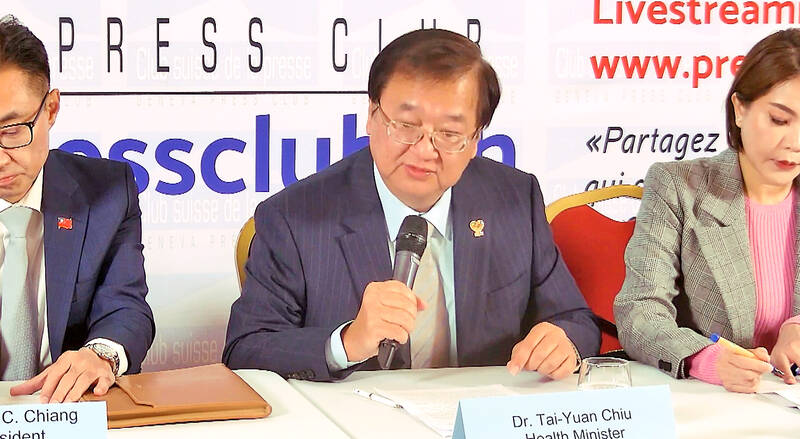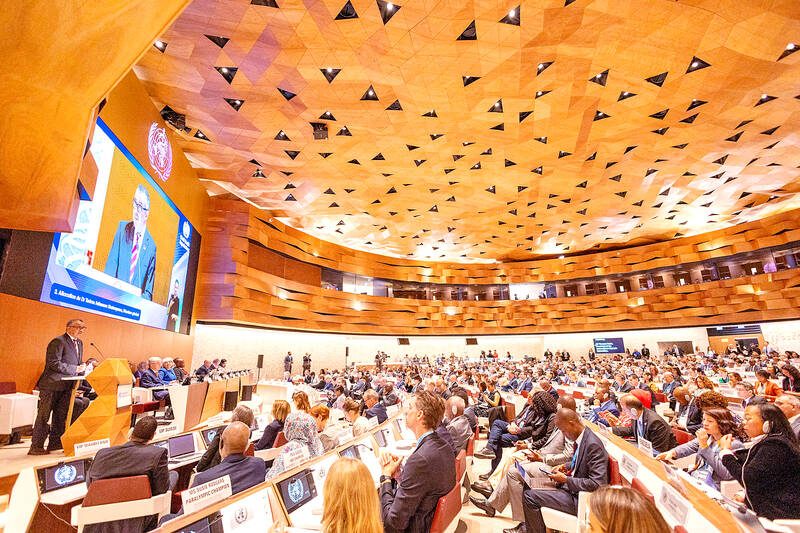Minister of Health and Welfare Chiu Tai-yuan (邱泰源) yesterday again called for the international community’s support as he urged the WHO to let Taiwan participate as an observer in the World Health Assembly (WHA).
The annual meeting of the WHA, the decisionmaking body of the WHO, began in Geneva, Switzerland, yesterday and ends on Saturday.
As Taiwan has not been invited to attend the WHA as an observer for the eighth year in a row, a delegation of health officials and experts led by Chiu arrived in Geneva on Friday to speak up for Taiwan and take part in bilateral meetings on the sidelines of the WHA.

Photo: screen grab from the Ministry of Foreign Affairs’s Facebook page
Joined by four legislators from across party lines, Chiu held an international news conference at the Geneva Press Club to speak about “How Taiwan’s participation in the WHO can contribute to a comprehensive global health network.”
“We are calling for the international community’s support and urging the WHO to act in line with this year’s WHA theme — ‘All for Health, Health for All’ — by including Taiwan in the proceedings of the WHA as an observer, and allowing Taiwan’s regular participation in WHO meetings, activities and mechanisms,” Chiu said in his opening remarks.
Taiwan supports actions that can save lives — promoting health and well-being, advancing primary healthcare, ensuring universal health coverage and meeting the UN Sustainable Development Goals, but the WHO continues to exclude Taiwan for political reasons, he said.

Photo: Reuters
“I would like to reaffirm that neither UN General Assembly Resolution 2758 nor WHA Resolution 25.1 mentioned Taiwan or provide legal authorization for the People’s Republic of China [PRC] to represent Taiwan in the UN system,” he said.
“Precluding Taiwan’s meaningful participation in the WHO based on these resolutions cannot be justified,” Chiu said.
“Neither the Republic of China [Taiwan] nor the PRC is subordinate to the other,” he said, adding that that is “the status quo across the Taiwan Strait and an internationally recognized objective fact.”
“China has no right to interfere with or restrict Taiwan’s participation,” he said, stressing that only the democratically elected government of Taiwan can represent its 23 million people in the WHO and other international forums.
“We sincerely appreciate the support extended by diplomatic allies and like-minded countries for Taiwan’s meaningful participation in the WHO,” he added.
Taiwan, being a force for good, has the capability and willingness to contribute to global health and well-being, and the whole world would benefit from its inclusion to the WHO and WHA, Chiu said.
Asked what name Taiwan would use to join the WHO, Chiu said. “Taiwan is Taiwan, and our country name is the Republic of China (ROC), so using ‘Taiwan’ or ‘ROC’ for joining the WHO or the WHA is what we will insist.”
Asked if Taiwan would find alternative ways to join the WHO or the WHA, aside from winning support from diplomatic allies and like-minded countries, Chiu said that, in the past few decades, Taiwan has educated and trained many outstanding healthcare professionals, and they have not only elevated the quality of domestic healthcare, but also participated in many international organizations.
Many Taiwanese healthcare professionals also play important roles in international organizations, such as the Taiwan Medical Association, which helped draft the World Medical Association’s statement on health emergency responses, he said, adding that Taiwan has more than 100 professional healthcare groups and their efforts would be the foundation of Taiwan’s successful WHO and WHA bid.
Many Taiwanese healthcare professionals are getting further education or training in other countries and building friendships with local professionals, who might eventually also hold key positions in world organizations, so the government would continue to provide more resources to professional healthcare associations to encourage international participation, he said.

The US government has signed defense cooperation agreements with Japan and the Philippines to boost the deterrence capabilities of countries in the first island chain, a report by the National Security Bureau (NSB) showed. The main countries on the first island chain include the two nations and Taiwan. The bureau is to present the report at a meeting of the legislature’s Foreign Affairs and National Defense Committee tomorrow. The US military has deployed Typhon missile systems to Japan’s Yamaguchi Prefecture and Zambales province in the Philippines during their joint military exercises. It has also installed NMESIS anti-ship systems in Japan’s Okinawa

‘WIN-WIN’: The Philippines, and central and eastern European countries are important potential drone cooperation partners, Minister of Foreign Affairs Lin Chia-lung said Minister of Foreign Affairs Lin Chia-lung (林佳龍) in an interview published yesterday confirmed that there are joint ventures between Taiwan and Poland in the drone industry. Lin made the remark in an exclusive interview with the Chinese-language Liberty Times (the Taipei Times’ sister paper). The government-backed Taiwan Excellence Drone International Business Opportunities Alliance and the Polish Chamber of Unmanned Systems on Wednesday last week signed a memorandum of understanding in Poland to develop a “non-China” supply chain for drones and work together on key technologies. Asked if Taiwan prioritized Poland among central and eastern European countries in drone collaboration, Lin

BACK TO WORK? Prosecutors said they are considering filing an appeal, while the Hsinchu City Government said it has applied for Ann Kao’s reinstatement as mayor The High Court yesterday found suspended Hsinchu mayor Ann Kao (高虹安) not guilty of embezzling assistant fees, reducing her sentence to six months in prison commutable to a fine from seven years and four months. The verdict acquitted Kao of the corruption charge, but found her guilty of causing a public official to commit document forgery. The High Prosecutors’ Office said it is reviewing the ruling and considering whether to file an appeal. The Taipei District Court in July last year sentenced Kao to seven years and four months in prison, along with a four-year deprivation of civil rights, for contravening the Anti-Corruption

NO CONFIDENCE MOTION? The premier said that being toppled by the legislature for defending the Constitution would be a democratic badge of honor for him Premier Cho Jung-tai (卓榮泰) yesterday announced that the Cabinet would not countersign the amendments to the local revenue-sharing law passed by the Legislative Yuan last month. Cho said the decision not to countersign the amendments to the Act Governing the Allocation of Government Revenues and Expenditures (財政收支劃分法) was made in accordance with the Constitution. “The decision aims to safeguard our Constitution,” he said. The Constitution stipulates the president shall, in accordance with law, promulgate laws and issue mandates with the countersignature of the head of the Executive Yuan, or with the countersignatures of both the head of the Executive Yuan and ministers or